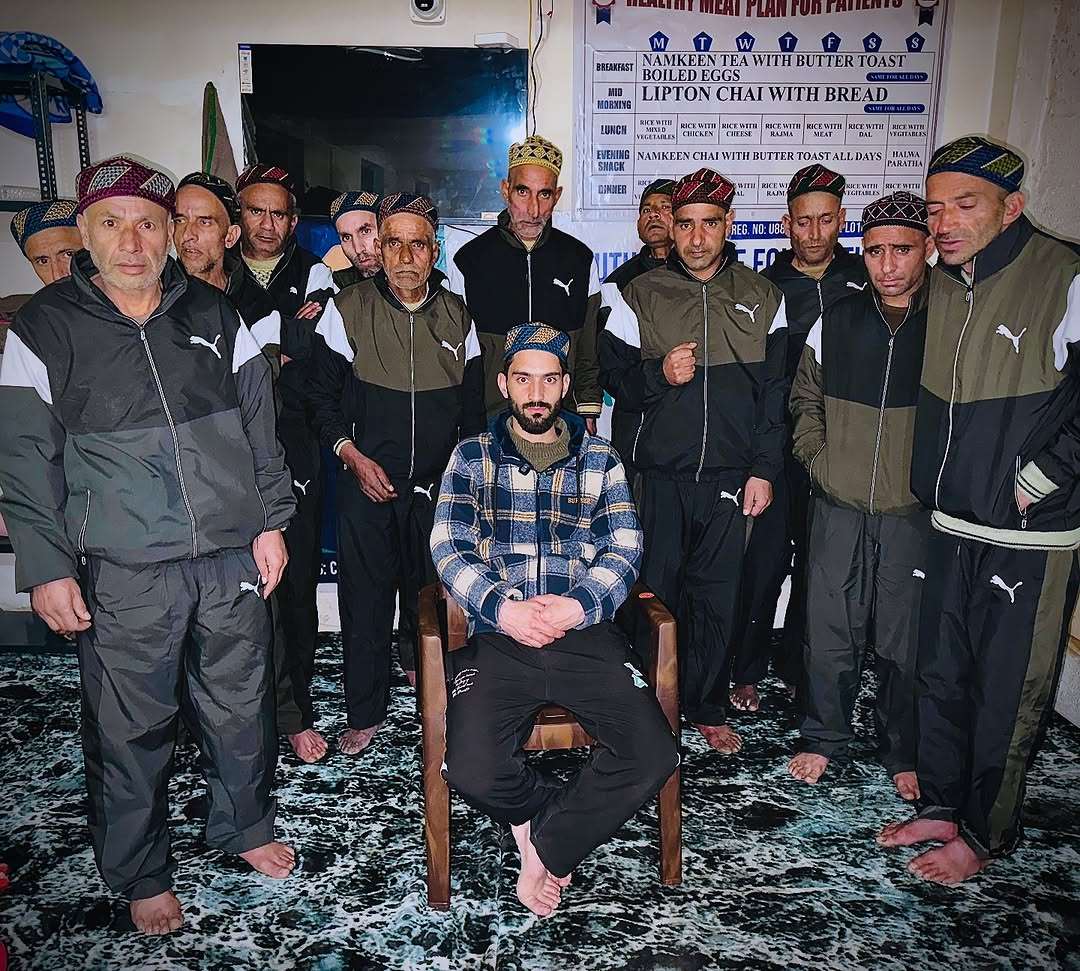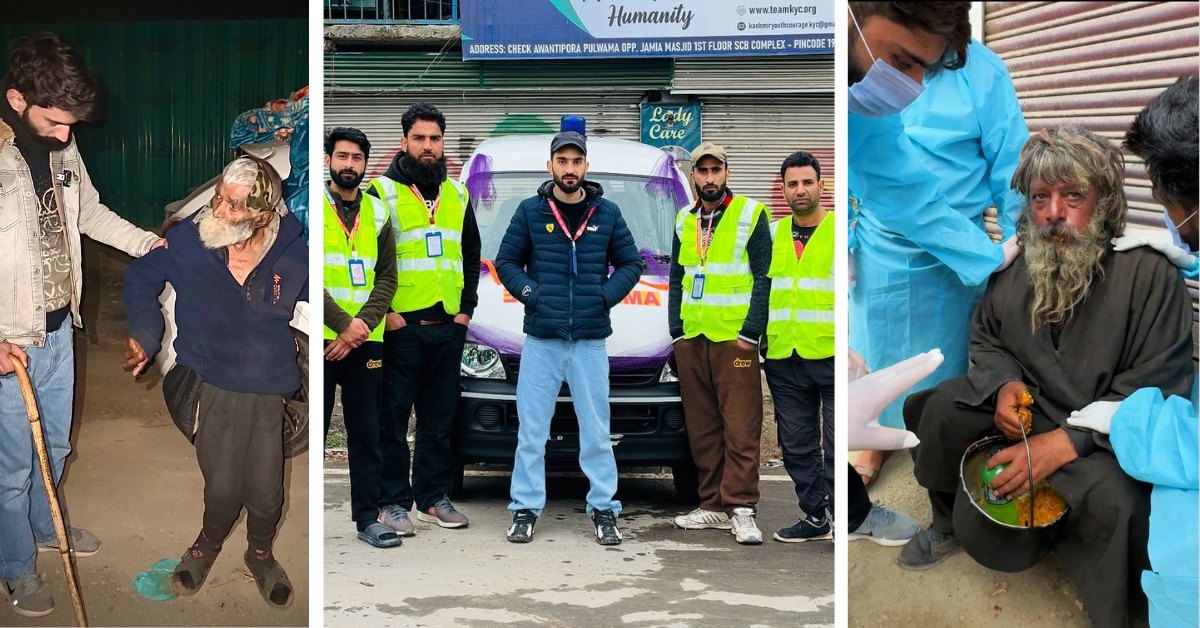‘If We Don’t Help Them, Who Will?’: This 22-YO Mobilised 600 Youth to Rescue Kashmir’s Homeless & Mentally Ill
Written by Tauseef Ahmad and Sajid Raina
A man shouting on the roadside. Torn clothes. A wild beard. No shoes. No shelter. Most people walked past. But one boy couldn’t forget.
It was a moment that stayed with him — an image lodged deep in his memory. That man had nothing. And yet, that boy, barely ten at the time, was headed home to a warm meal, clean clothes, and a family waiting for him.
“As I sat down for dinner one night,” Musadiq Bashir recalls, “I couldn’t stop thinking about this middle-aged man I’d seen on the roadside. His clothes were torn, his beard unkempt. He looked like he had no one. Meanwhile, I had everything — a home, food, family. That thought never left me.”
Years passed. The image didn’t fade. In 2022, now a 22-year-old engineering student in Pulwama, Musadiq began noticing more and more people like that man from his childhood — silent, suffering, and invisible to most.
He started walking the streets, this time not just observing but wanting to do something. He spoke to friends and shared what he saw. What started as quiet conversations turned into a shared purpose: to reach out to the mentally unwell, the homeless, and the abandoned and offer them food, clean clothes, a gentle word, and, if possible, a way back home.
 In less than two years, KYC has helped over 45 abandoned or mentally unwell individuals across Kashmir.
In less than two years, KYC has helped over 45 abandoned or mentally unwell individuals across Kashmir.
This desire to act grew stronger with every encounter. And soon, a small group of friends decided to turn their concern into something concrete. They began going out together, carrying simple care packages — food, soap, blankets. Slowly, they built trust with the people they met.
From those first acts of kindness, Kashmir Youth Courage (KYC) was born. With a dedicated team of 21 active members at its core, the initiative has already helped more than 45 individuals across Kashmir — some reunited with their families, others given shelter and care after years of neglect.
From late-night walks to a movement of 600 hearts
What began as an informal effort among a few friends quickly grew. Word spread — both about the people they were helping and about the young volunteers offering support without judgement. Today, KYC boasts a network of 500 to 600 members across every district in Kashmir.
“They are ready to do this work,” says Musadiq. “They care.”
Operating from a modest rented space that serves as both shelter and community centre, KYC’s work is now both spontaneous and organised. At any given time, around 10 to 15 people are being housed in their rented shelters — offering not just food and safety but a rare sense of belonging. Every day, volunteers take to the streets, actively searching for people who have fallen through society’s cracks — those battling mental illness, those abandoned by families, or those simply lost.
The first step is trust
Building trust is at the core of everything they do. The team understands that many of the people they encounter have faced years of rejection, suspicion, or even abuse. So they begin not with instructions — but with presence. “Many people expect aggression,” Musadiq explains. “But when we show up with kindness, they slowly start to trust us.”
Yawar Rashid, who is one of the volunteers at KYC, shares how they respond when a family reaches out. “We ask for a photo to assess the person’s condition. Then we try to approach gently and convince them to come with us. It takes time and patience.”
These encounters are rarely easy. One of their most difficult rescues involved a businessman from Srinagar who had lost Rs 20–30 lakh in a failed venture in Nepal. The financial loss sent him into a spiral of depression. Eventually, he cut ties with his family and vanished into a life of isolation.
“When we found him, he was angry and afraid,” Musadiq says. “He kept shouting for his wife. He didn’t want to be touched or spoken to. But we stayed.” The volunteers gave him space and time, then slowly offered help. A haircut. Clean clothes. A safe bath. A mirror. “When he looked at himself, something shifted,” Musadiq recalls. “It was like he remembered what it felt like to be cared for.”
At first, KYC’s efforts confused many. Some questioned why these young people were intervening in something they believed wasn’t their responsibility. Others wondered whether any of it would make a difference. But as more people were helped, stories began to spread — not just online, but also through the quiet conversations of neighbours, shopkeepers, and families.
A resident of Srinagar shares, “Earlier, we’d ignore the homeless. Now, we see them as people who need help.”
In Pulwama, a local shopkeeper recalls seeing KYC volunteers buying food for the homeless on a regular basis. “They don’t just talk about change. They do the work.”
This shift in public perception became one of KYC’s biggest achievements. Not only were they helping people in need — they were changing how the community viewed them. More people began donating clothes, food, and supplies. Shopkeepers offered discounts. Students and working professionals stepped forward to volunteer. What began as a ripple became a wave.
‘They gave me a second chance’
But for KYC, the goal isn’t just to provide temporary relief. Their real mission is to restore dignity. To offer a long-term path forward. Whenever possible, they try to reconnect individuals with their families. For those who can’t or won’t return home, KYC offers shelter, support, and a renewed sense of purpose.
 KYC runs entirely on public support — donations, time, and kindness from the community.
KYC runs entirely on public support — donations, time, and kindness from the community.
Take Sameer, a middle-aged man diagnosed with schizophrenia. After being abandoned by his family, he had nowhere to go. When KYC found him, he was cautious, unsure of what they wanted.
But they persisted — with warmth, not pressure. Over time, Sameer began trusting them. Not only did he regain a sense of security, but he also became one of their most committed volunteers. “It feels good to be useful again,” he says. “They gave me a second chance.”
Because looking away is no longer an option
Musadiq believes that this work shouldn’t be limited to one group or one region. He dreams of KYC’s model being replicated elsewhere. He knows the problem is not unique to Kashmir. “This is not just about one place. There are abandoned people everywhere. If we can help here, others can help elsewhere.”
However, KYC’s journey hasn’t been without hurdles. They are still operating on limited resources. Their shelter space is small. Medical supplies are often hard to source. The organisation relies entirely on public goodwill and voluntary contributions.
“Even small donations help,” Musadiq says. “But if you can’t give money, give your time. Think about these people. If you see someone lying on the road, offer them food. They are human beings, just like us.”
In a world where it’s all too easy to walk past pain, the young volunteers of Kashmir Youth Courage are choosing to stop. To look. To care. They are showing what it means to restore not just bodies but dignity and hope.
As Musadiq puts it, “If we don’t help those who have no one, then who will?”
If you wish to support Kashmir Youth Courage’s work, you can contribute here:
Account No: 1003010100000200
IFSC: JAKA0TOKUNA
UPI: JKBMERC00260553@jkb
For queries, call: 9622969690
Edited by Khushi Arora; All images courtesy Kashmir Youth Courage
News